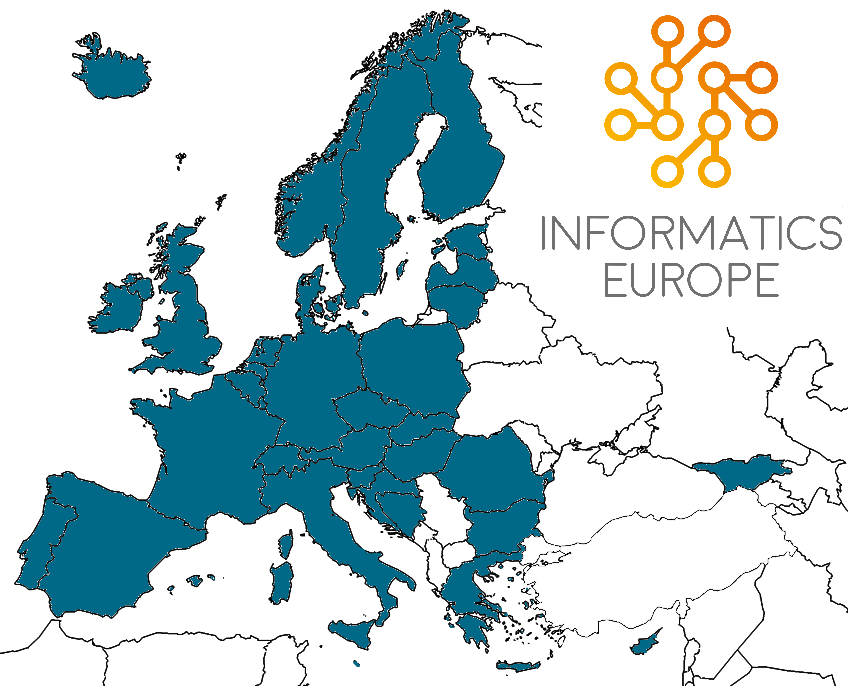Why and How to Join
Because we have a common cause and a common interest.
Informatics is a distinct science, characterised by its own concepts, methods, and body of knowledge. Raising a strong and consensual community voice is today more relevant than ever.
Computer and Information Scientists throughout Europe face many of the same challenges. Informatics Europe provides an arena to discuss and coordinate strategic issues and emerging trends on research, education and social impact of Informatics at a European level. Fostering unity in the variety of our member institutions, and promoting pan-European collaboration, we empower our community to engage in continuous improvement and active policy shaping of the discipline in Europe.
Our potential can go as far as our collective ambitions take it.
Join us now and contribute to increasing our weight in change-making decisions at the European level.
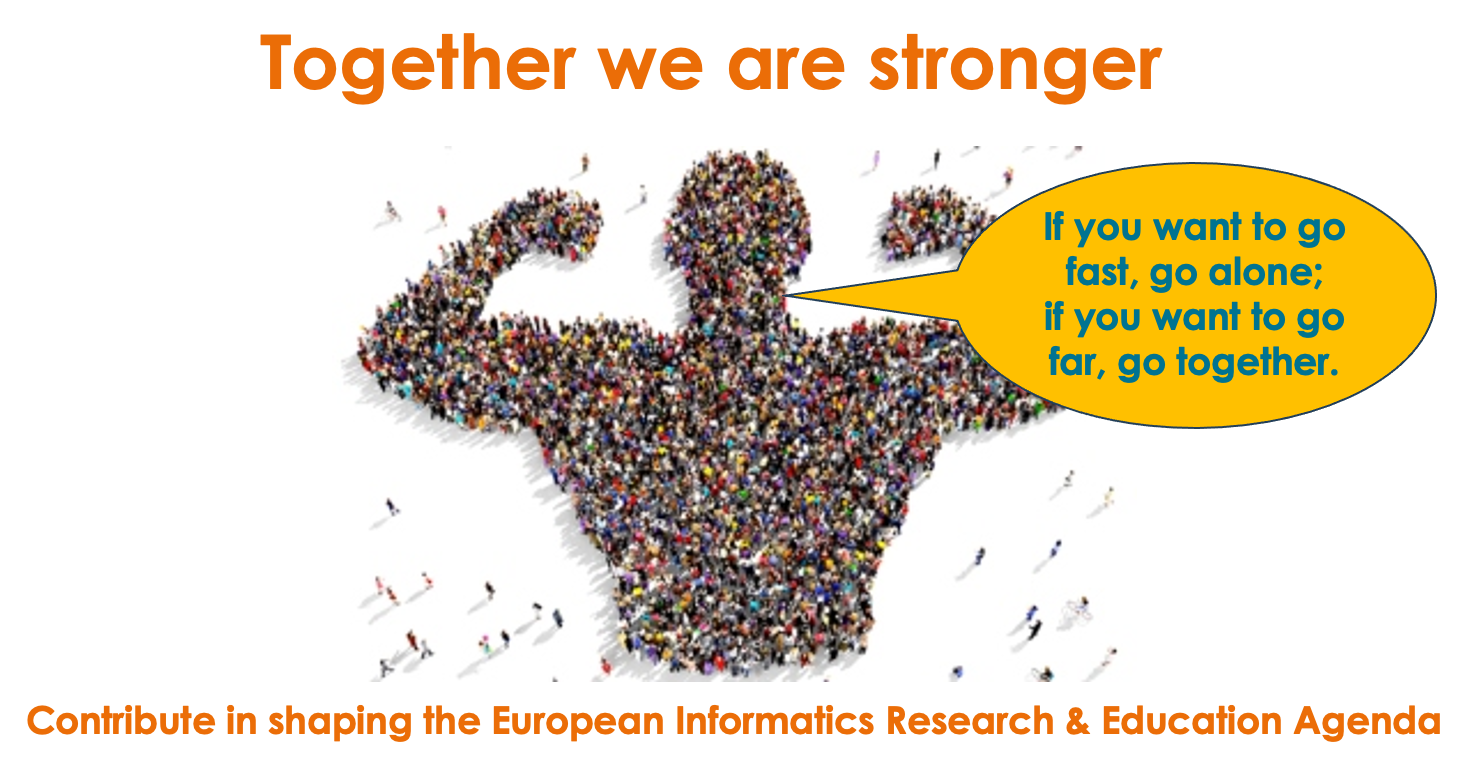
Become a Member Download our Flyer
Membership Benefits
Institutions join Informatics Europe (IE) because they believe in the need for a united and strong European Informatics research and education community. However, membership also offers valuable, tangible benefits for both institutions and their colleagues. Below is a summary of key advantages, or you can download the extended version here.
Key Membership Benefits
IMPACT - Amplified Advocacy
- Influence European policies through strategic discussions and expert recommendations.
- Collaborate with 200+ institutions across 30+ countries to advocate for Informatics.
- Magnify individual efforts and strengthen the collective voice of our community in Europe.
EXPOSURE - Enhanced Visibility & Network
- Gain international recognition through IE working groups, committees and publications.
- Network, collaborate on (EU-funded) projects, and stay at the forefront of strategic discussions.
- Maximise the outreach of your topics of interest with IE’s endorsement.
RESOURCES for Strategic Positioning
- Benchmark and gain key institutional insights through peer discussions and evaluations.
- Enhance education and research through international collaborations, empowered faculty and exclusive data.
- Access IE resources free or at reduced fees, such as leadership training, department evaluation, job postings, and Informatics Higher Education Data Portal.
Additionally, all new members each year are invited to a 'New Members Only' get-together with IE representatives. This meeting takes place in connection with the ECSS and aims at identifying common interests as well as the best collaboration patterns with our new members.
Access to Membership Benefits
Academic Institutions, Research Labs, and Companies
Membership is institutional. Full benefits extend to all faculty of your department/faculty or researchers of your lab/company.
Our annual Membership-fee scheme for academic and public research lab members is structured to reflect the department/institution size and national GDP. More details are explained below under "Types of Membership - Fees".
National Informatics Associations (NIAs)
NIAs members of Informatics Europe bring forward and represent consensual national perspectives to European discussions and policy recommendations, while contributing national debates with the outcomes produced by the Informatics Europe community. Their executive and management boards are welcome to engage by:
- participating in our Working Groups;
- participating in the Policy Recommendations Working Group, which is open to representatives of NIAs only;
- bringing forward topics to be discussed during one of the sessions of ECSS (NIAs workshop) and collaborating in its organization;
- acting as ambassadors to strengthen and shape the informatics education and research community in Europe, as well as in their respective countries;
- joining ECSS at IE-members’ discount rates;
- accessing IE members-only reports;
- nominating themselves as Informatics Europe Board of Directors candidates.
NIA membership does not extend to their affiliated institutions, which must apply IE membership separately to access the full range of academic membership benefits.
Who can be a member?
Membership is institutional and open to:
- academic faculties or departments of Informatics, Computer Science, Computing, IT, ICT,
- research laboratories (public or private) in Informatics, Computer Science, Computing, IT, ICT,
- national and international associations in Informatics, Computer Science, Computing, IT, ICT,
- industrial organisations interested in these topics.
All membership applications will be analyzed by the Membership Committee, which will provide a motivated recommendation to the Informatics Europe Board on accepting or declining each application based on the following evaluation criteria.
Evaluation criteria for academic members:
- Level of education in Informatics (also known as Computer Science or Computing), with as minimal requirements:
- Be accredited in the country as a tertiary education institution, and
- Have a study program related to Informatics at the Master's or Doctoral level.
- Level of research in Informatics, with minimal requirements:
- Having permanent staff actively engaged in research, and
- Publications in recognized research venues.
- Situation of the national scenario of tertiary education.
- Role of the requesting institution in the national context.
Evaluation criteria for public/private research laboratories:
- Actively conduct research in Informatics (also known as Computer Science or Computing), with as minimal requirements:
- Having permanent staff actively engaged in Informatics research, and
- Publications in recognized research venues related to Informatics.
- Actively participate in research activity with:
- National/international academic institutions, or
- European research institutions or companies.
- Willingness to actively support Informatics Europe activities.
Evaluation criteria for national associations:
National Associations are networks of university departments and/or individuals in Informatics/ Computer Science/ Computing and related fields who have the mission to actively represent the national informatics community in a European country on matters directly related to Informatics Research and Education (e.g. policy formulation/implementation, domain representation, lobbying).
Evaluation criteria for industrial organizations:
- Engaged in product/services development related to Information Technology, with as minimal requirements:
- Being engaged in activities that require academically-trained informatics staff at Master/PhD level, and
- Being engaged in R&D activities leveraging advances in the field of Informatics.
- Willingness to actively support Informatics Europe activities.
Corporate organizations, foundations and other institutions who do not fulfil the above criteria but do share an interest in our mission and are wishing to support the Informatics research community in Europe are welcome to explore our sponsoring possibilities
Membership Committee:
- Kim Mens, Informatics Europe Board Member
- Lenuta Alboaie, Informatics Europe Board Member
- Nuria Anguera, Informatics Europe Executive Director
When necessary, the Membership Committee will include, additionally, one or two country experts.
Types of Membership - Fees
As of 1 January 2025, the following membership fee scheme applies. This scheme has been approved by Informatics Europe members at the 2024 AGA to better accommodate the range in department/faculty sizes and to reflect current economic parameters within Europe. Membership fees are collected once per year.
New members joining throughout a given year contribute with the complete annual fee. Those registering between July and October benefit from a complimentary registration to our annual ECSS conference (one individual per institution). New members joining after ECSS (late October) are charged a pro-rata amount for the remaining days of the current year, together with the following year's invoice.
Academic Membership & Public Research Labs Membership
Two factors determine the annual membership fee for academic as well as for public research lab members :
- Country zone: based on national GDP per capita, PPP (current international $).
- Size: number of permanent Informatics FTE Faculty* teaching and doing research at the member institution (department/school/faculty/institute)
| Institution Size (FTE Faculty) |
Zone 0 (GDP > 65K) |
Zone 1 (GDP 65 - 50K) |
Zone 2 (GDP 50 - 35K) |
Zone 3 (GDP < 35K) |
| Small (≤ 15) | EUR 1,650 | EUR 1,200 | EUR 900 | EUR 600 |
| Medium (16 ≤ 24) | EUR 2,300 | EUR 1,750 | EUR 1,200 | EUR 900 |
| Large (≥ 25) | EUR 3,100 | EUR 2,400 | EUR 1,750 | EUR 1,200 |
*Permanent faculty members refer to individuals, such as professors, lecturers, and researchers, whose position does not have a predefined end date. For our purposes, positions on tenure-track schemes (or similar) are considered permanent. Non-academic staff is not considered faculty.
Country zone mapping is based on the latest World Bank GDP per capita data (2023).
- Zone 0: Denmark, Iceland, Ireland, Luxembourg, Netherlands, Norway, Switzerland.
- Zone 1: Austria, Belgium, Cyprus, Finland, France, Germany, Italy, Malta, Sweden, United Kingdom.
- Zone 2: Andorra, Croatia, Czech Republic, Estonia, Greece, Hungary, Israel, Latvia, Lithuania, Poland, Portugal, Romania, Slovakia, Slovenia, Spain.
- Zone 3: Albania, Armenia, Azerbaijan, Bosnia and Herzegovina, Bulgaria, Georgia, Macedonia, Moldova, Montenegro, Serbia, Turkey, Ukraine.
Federated Membership
Federated members represent a grouping of up to five academic/research institutions that can apply for this type of membership to overcome the financial limitations of small institutions if they share a common geographical or cultural denominator.
- The Federation has one vote at the Annual General Assembly and is entitled to one representative in activities where only one participant per member is allowed.
- All of its members receive the same access to resources, services, and benefits as regular members
Membership fee: See table above. For federated members, the FTE Faculty count is the sum of the faculty numbers in each institution forming the federation. Should federated members wish to receive individual invoices for their share of the membership, 50 EUR per extra invoice will be charged. For more details, please contact This email address is being protected from spambots. You need JavaScript enabled to view it..
National Informatics Associations Membership
National Associations of Informatics institutions (alone or mixed with individuals) are considered large academic members in their respective country zones. The membership fee of National Informatics Associations of academic members is waived when over ⅓ of all potential academic members join Informatics Europe as direct members.
Two factors determine the annual membership fee for National Associations of individuals:
- Country zone: based on national GDP per capita, PPP (current international $)
- Size: number of members
| NIA Size (# members / GDP pc) |
Zone 0 (GDP > 65K) |
Zone 1 (GDP 65 - 50K) |
Zone 2 (GDP 50 - 33K) |
Zone 3 (GDP < 33K) |
| Small (< 250) | EUR 1’200 | EUR 900 | EUR 600 | EUR 375 |
| Medium (250 < 500) | EUR 1’650 | EUR 1’200 | EUR 900 | EUR 600 |
| Large (500 < 750) | EUR 2’300 | EUR 1’750 | EUR 1’200 | EUR 900 |
| Very large (≥ 750) | EUR 3’100 | EUR 2’400 | EUR 1’750 | EUR 1’200 |
Associate Membership
Associate members are organisations with which Informatics Europe collaborates. Associate members do not vote, do not participate in committee chairmanship, and do not have full access to all resources.
Membership fee: Between 500 EUR and 5,000 EUR, depending on organization's size and country (decided by the Informatics Europe Membership Committee).
Candidates for Associate membership are kindly requested to write to This email address is being protected from spambots. You need JavaScript enabled to view it. briefly explaining the reasons for their expression of interest, in particular their fit with our mission and goals.
Industrial Membership
Private laboratories and industrial organizations. Benefits are the same as for academic members.
Total industrial dues are established by the Board membership committee taking into account the company size and its internal workings. Total dues combine a minimum membership fee of 3.700 EUR/year with the support to concrete IE initiatives, but do not include customized services for a given member. For further information please contact our executive director This email address is being protected from spambots. You need JavaScript enabled to view it..
Application Process
The Membership Committee, assisted when necessary by national experts, will examine your membership application with respect to the four evaluation criteria mentioned above and provide a motivated recommendation to the Board of Informatics Europe which will decide about your Membership. Please note that the process may take some weeks and we could contact you for further documentation proving the eligibility to become our member.
Once your membership application is approved by the Board of Informatics Europe, our staff will get back to you with further information about your membership and payment details.
Candidates for Associate membership are kindly requested to write to This email address is being protected from spambots. You need JavaScript enabled to view it. briefly explaining the reasons for their expression of interest, in particular their fit with our mission and goals.
Membership Statistics
Growth
Informatics Europe's origins are linked to the first ECSS (formerly the European Computer Science Summit, now the European Informatics Leaders Summit), a call by the Informatics Department of ETH Zurich and EPF Lausanne (Switzerland) to all European peers in 2005. In two years, the organization grew to 45 members and has experienced steady growth, reaching an average net annual membership growth of 9% as of 2024.
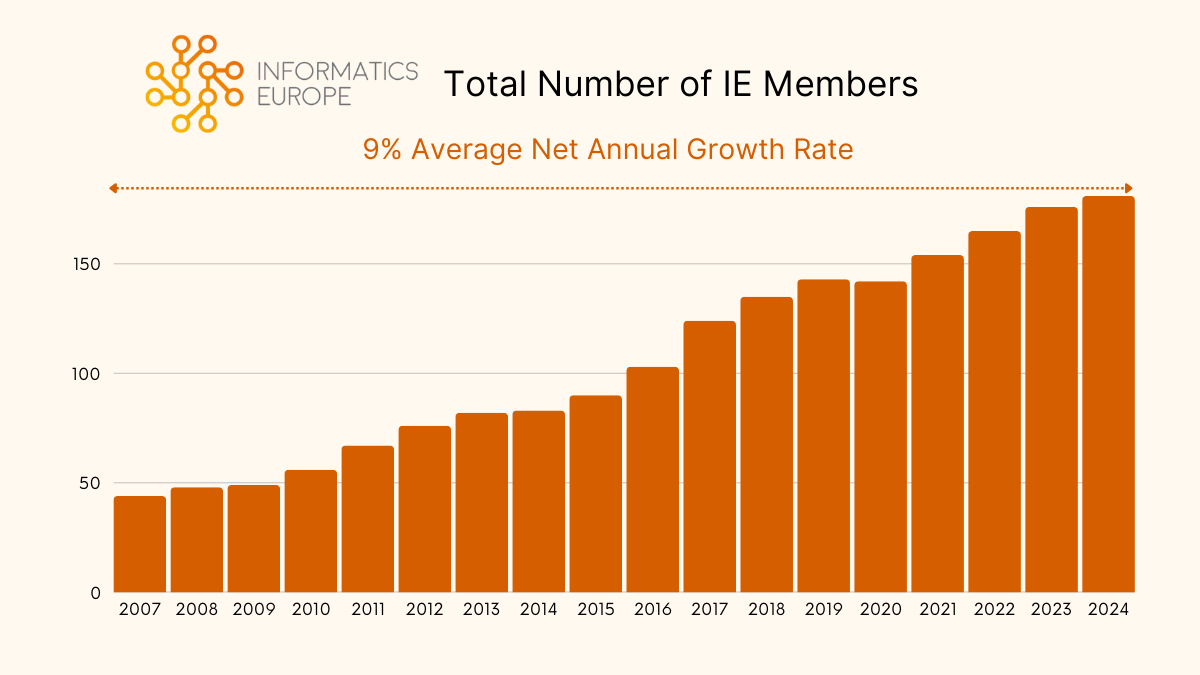
We are a thriving organisation, steadily expanding with immense potential for further growth!
Members Ranking
70% of the top 30 European universities offering Informatics studies (QS World University Ranking 2025 by Faculty Area) are members of Informatics Europe. The QS World University Ranking evaluates universities worldwide across various disciplines.
Research Reach
To ensure a comprehensive representation of European researchers at the earliest opportunity, the organization initially prioritized contacts with prestigious large Informatics departments and labs (counting more than 25 permanent faculty or researchers). Today, over 70% of our members still belong to this category.
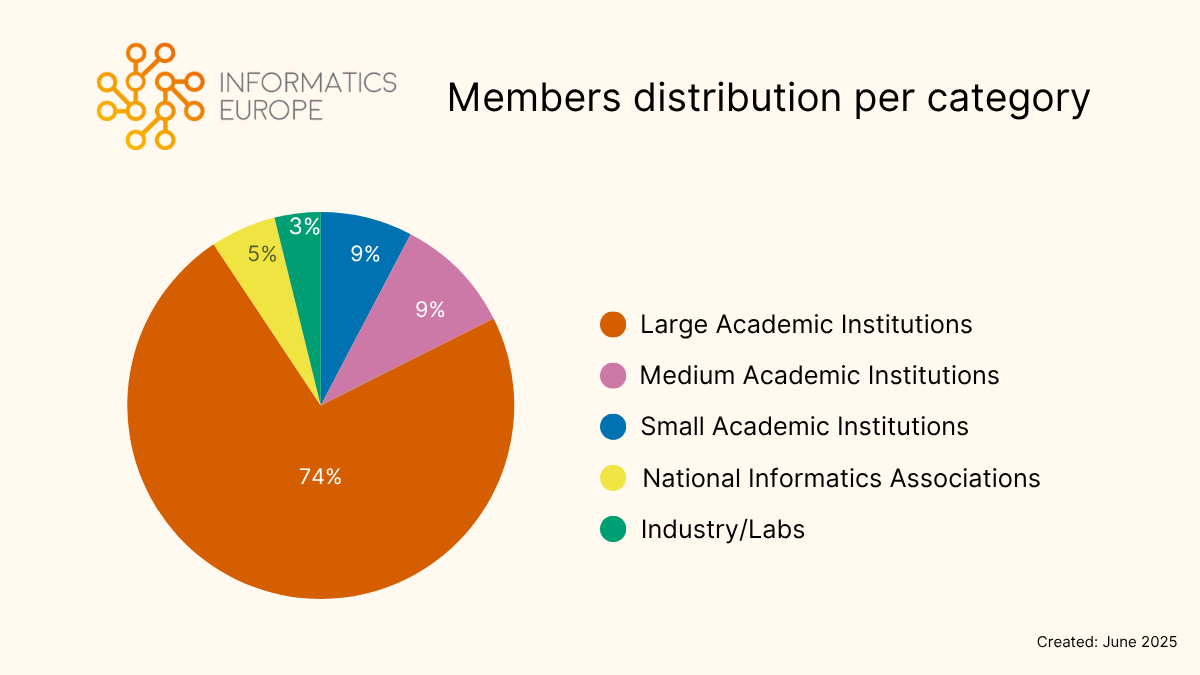
We are currently working on reaching a balanced representation of small and medium institutions as well, in the interest of diversity and to truly represent the community at large. The number of institutions counting less than 25 faculty or researchers is thus steadily increasing.
All in all, Informatics Europe represents some 50’000 informatics researchers.*
*Assuming an average of 7 people per research group and 10, 20, 50 research groups for small, medium respectively large institutions.
Teaching Reach
In terms of the Informatics student population in Europe, we estimate having a direct impact on at least half a million students. While we work on collecting exact data from our members, this is our best estimate for bachelor's, master's, and PhDs studying at our member institutions.
Geographical Reach
Informatics Europe represents the academic and research community in Informatics in Europe and neighbouring countries. Our membership currently encompasses more than 30 countries, covering over 75% of the targeted country reach:
Informatics Europe fees are determined in terms of the purchasing power of our members, who are divided into 4 zones depending on their national GDP per capita, PPP. At present lower-income countries are underrepresented in our membership base, but we are working to change this. Having a more balanced representation of our Board of Directors from each of these 4 zones is also part of our strategy, and for that we are trying to include more board members from zone 3.
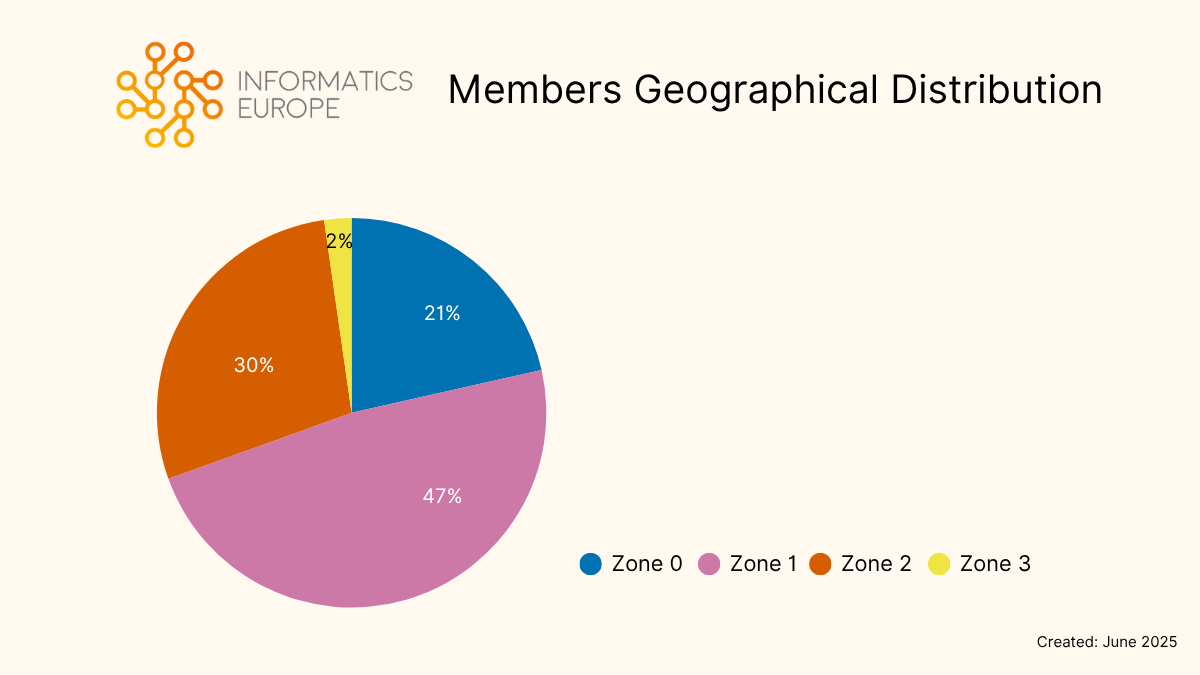
Zone 0: Denmark, Iceland, Ireland, Luxembourg, Netherlands, Norway, Switzerland; Zone 1: Austria, Belgium, Cyprus, Finland, France, Germany, Italy, Malta, Sweden, United Kingdom; Zone 2: Andorra, Croatia, Czech Republic, Estonia, Greece, Hungary, Israel, Latvia, Lithuania, Poland, Portugal, Romania, Slovakia, Slovenia, Spain; Zone 3: Albania, Armenia, Azerbaijan, Bosnia and Herzegovina, Bulgaria, Georgia, Macedonia, Moldova, Montenegro, Serbia, Turkey, Ukraine.
Testimonials
Universidad de Castilla - La Mancha
"As a senior professor in informatics, I cannot stress enough the significance of joining Informatics Europe (IE). I am thankful for representing my department in IE to encourage collaboration and innovation in our field for nearly two decades! IE offers opportunities for professional development and networking through its working groups, annual conference, awards, and resources. Joining Informatics Europe should be a must for any responsibly acting informatics department from a political, societal as well as from a discipline viewpoint."

